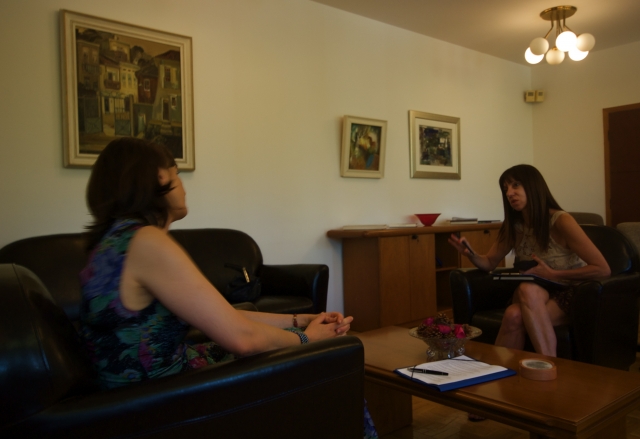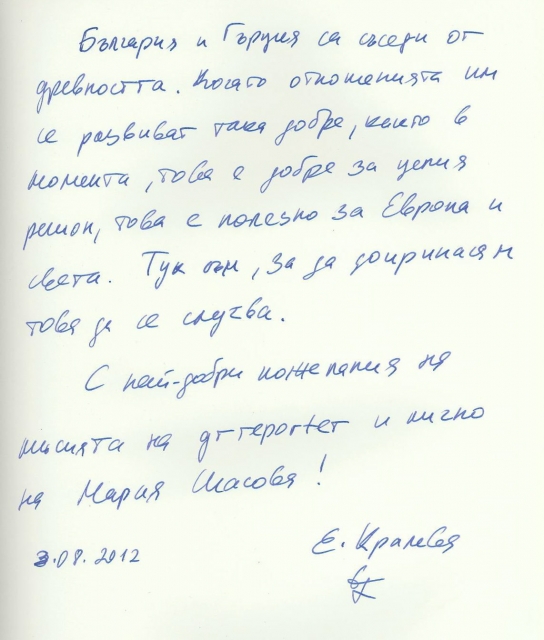Photos: Vassilis Vifidis
Emilia Kraleva has been the new Ambassador of Bulgaria in Athens since May 2012. She represents the modern face of Bulgarian diplomacy, which is characterised by high professionalism and a pragmatic attitude to the specifics of international relations. She graduated in history from Sofia University "St. Kliment Ohridski" and specialised in Balkan history while she was studying. She was working in the Ministry of Foreign Affairs for twenty years, dealing with the Balkan relations and the coordination of the Common Foreign and Security Policy of the European Union. She had worked in our embassy in Athens as well as in London. She returned to the Greek capital after an eight-year break and with memories of the Summer Olympics in 2004. Maria S. Topalova talked with Ambassador Emilia Kraleva.
Your term begins in a period of serenity in the Bulgarian-Greek relations on the one hand and of a serious economic, political and social crisis on the other. What are your professional challenges in the next three years?
It is a challenge for me to go back to Athens especially as the head of our mission after many years of working in the field of Bulgarian-Greek relations. I should contribute to fill these good relations with more meaning that will satisfy the modern era, will help to bring the two nations even closer, to better understand the problems of the other and help each other to overcome them.
I think it is very important to improve the direct links between the two administrations. Both countries are members of the European Union, we have a common legal basis to ground ourselves on and we could very easily work in this direction, if there is a common understanding of the opportunities it offers us. There is always something to be done, to support many areas. Contributing to the improvement of economic cooperation is the first and foremost, the most important thing, it is number one.
What are the priority areas of economic cooperation? Where is the greatest potential for growth?
In my opinion, there is potential in every area. Everything is progressing well, but things can always be even better. Of course, economic relations need to develop; both countries have a boundless growth potential in tourism. Greece is a traditional tourist country and so is Bulgaria, though in another sphere. There are opportunities to combine what each of the countries offers. Of course, we have the sea and the beaches, but what we can offer in a combined package is the mountains. It is not only ski tourism; there are many untapped opportunities - spa tourism, rural tourism, which are things modern man is interested in not only in Europe but also worldwide.
Why haven’t tourism entrepreneurs exploited these opportunities so far and what are the state tools of intervention in tourism, which is mostly a private field?
Indeed, we all expect the market to self-organise because for a long time, nobody has believed in the government intervention in the economy. These options have been discussed after the crisis. I do not think it is an obligation of the state but it could create the relevant conditions and encourage private initiatives in both countries. There are combined packages even now - they are available in the Japanese market, for example. However, this practice may be further promoted.
Greece is one of the largest investors in Bulgaria. How has the economic crisis affected those investments, in which areas are they most successful and in which fields is there potential for development?
Greek investments in Bulgaria are very successful in general. Bulgarian President Rosen Plevneliev met recently with leading Greek businessmen and investors in Bulgaria from various circles and the responses were generally positive. These are sectors such as telecommunications, steel, manufacturing of aluminium products. There are many investments in Bulgarian tourism, in hotel chains. Each of them has its problems but these investments are mainly successful. Greek banks in Bulgaria are still totally successful, and this is due to the healthy financial climate in the country and the supervision carried out by the Bulgarian National Bank. In general, the conditions for doing business in our country are very good. Greek businessmen fit very well into the environment in Bulgaria, find their path, and the majority of them are actually very successful.

Were future ideas for unused opportunities for cooperation discussed during these conversations?
The most important result was the decision to hold a joint meeting of the two ministerial councils in the shortest possible time – by the end of October or in early November. A very thorough preparation by the entire Bulgarian and Greek administrations is necessary in order for this joint meeting to be successful. Many new ideas and projects will be specified there.
The cooperation in combating terrorism and organised crime has become of current interest following the attack in Burgas. How successful is it?
It is still a very successful area of cooperation and there is no reason to comment on the attack in Burgas. No details can be publicly announced but this area is very active. The channel of communication is direct and there are concrete achievements in this regard. The cooperation is very close and there is nothing in the shade. I am saying this with satisfaction as an ambassador.
What is the position of Greece regarding the inclusion of Bulgaria into the Schengen area?
At the level of the Head of State, at the ministerial level of domestic and foreign affairs, at all levels, in all my contacts so far I have not heard anyone opposing or setting any additional conditions for its accession to Schengen. We have complete support in this regard and it has been confirmed at the joint meetings held on this topic, including the support of the Justice and Home Affairs Council at the European Union. Greece supports us substantially. The moment we meet all the requirements, Greece is not the country that sets new, non-existent requirements and it does not make obstacles. I do not mean to draw a rosy picture, but we really have the unconditional support of Greece, because we have met the criteria in practice.
Our entry into the Schengen system is of mutual interest to both countries. Greece supports us not because it is a friendly country, but because it really is in our mutual interest. Channels of cooperation are to be established when this formal border between the two countries is removed. The way from Greece to Central Europe will be fully open with the inclusion of Romania as well. This will further intensify the cooperation between the Bulgarian and Greek institutions.
How do the two countries cooperate to limit illegal immigration?
Much has been done in this direction. There are questions and problems with individual cases sometimes but they are resolved very quickly. We have exchanged representatives of both Ministries of Interior and they are highly active. They have a reputation of police attaches but the name does not correspond to their position, which is much broader. They represent all the powers of an interior ministry, not just of the police.
Culture as an area of cooperation has been much underestimated. The Hellenic Foundation for Culture has had an office in Sofia for several years now. There is no Bulgarian cultural centre in Athens, however. What is the reason?
Yes, there has been some underestimation but due to financial difficulties. Such delays can be expected with the very restrictive fiscal policy pursued in both countries. We can benefit from the experience of Greece in this respect and create a foundation to represent us not only in Greece but also worldwide. Culture, however, is also an area that does not need to be subsidised by the state; it was typical for different times. Yes, we will strive to reach an agreement to create such centres, but I could not say in what form they will develop. It depends on the funding that will be allocated and this is the main issue. Our Ministry of Culture is willing to be very active in this area but it all comes down to funding. Otherwise, there is cultural exchange, visits of groups, exhibitions. There are centres teaching the Bulgarian language, mainly in northern Greece and elsewhere too. We seek to help as far as we can. The Hellenic Foundation for Culture is also involved in organising Greek language courses in Bulgaria. There is an interest obviously. It is our priority to support the Bulgarian Sunday schools here that teach the Bulgarian language, history, geography and literature to the Bulgarian children growing up in Greece. And they are not few.
How do you help them?
The Ministry of Education and Science has a special programme to allocate funds to these schools according to the number of students there. We help with the Agency for Bulgarians Abroad in all other ways. As an Embassy, we try to always be at schools during important events, we maintain the dialogue with them and we are aware of their problems, we help them to contact the relevant institutions in Bulgaria.
During his visit to Athens, President Rosen Plevneliev announced that the government is working on a new strategy for Bulgarians Abroad. Could you say what the main priorities in this strategy will be?
The project is being currently developed. It circulates between the institutions and it is not yet finalised. I would not like to comment on it because I do not know the final version in which it will be released. I hope that it will be the best that can be invented for such a complex Diaspora as the Bulgarian one in the modern times. It includes various Bulgarian communities with very different backgrounds, with different social status, which is different in different countries. I hope this concept will provide the embassies and institutions with the necessary flexibility in order to respond to the specific situation in a particular country rather than being the same for all regardless of where and how the respective Bulgarian group has been formed.
Speaking of Greece, what is the specificity of the Diaspora here?
The first thing that makes it different is that it is one of the largest diasporas in Europe. There are no accurate statistics to draw a full picture due to its mobility. Unofficially, we believe that the Bulgarians in Greece are not less than 250 thousand. This is a large group formed by people who have come here to work and earn a living. Some of them migrate and are seasonal workers. No more than 70 thousand are officially registered. The rest are mobile. There are many specifics in terms of what they do, in what areas they are engaged. Some of them are well established, have created their own companies, have their own schools funded by the government. Our task is to recognise and analyse the Diaspora, to see in what direction it will develop and what assistance it will need. The most important thing for me is education and the preservation of the language and culture of our people. Therefore, we will work in this direction in accordance with the available resources and people.
 Ambassador Emilia Kraleva wrote for the readers of GRReporter:
Ambassador Emilia Kraleva wrote for the readers of GRReporter:
“Bulgaria and Greece have been neighbours since ancient times. When their relations have developed so well as at present, it is good for the whole region, it is good for Europe and the world. I am here to make my contribution, to make it happen.
Best wishes to the mission of GRReporter and to Maria S. Topalova in person!”
03/08/2012
Follow Maria S. Topalova on Twitter